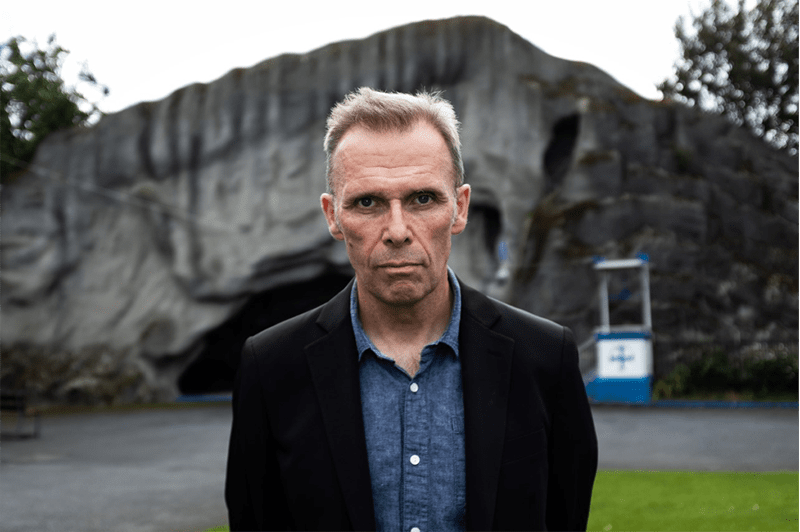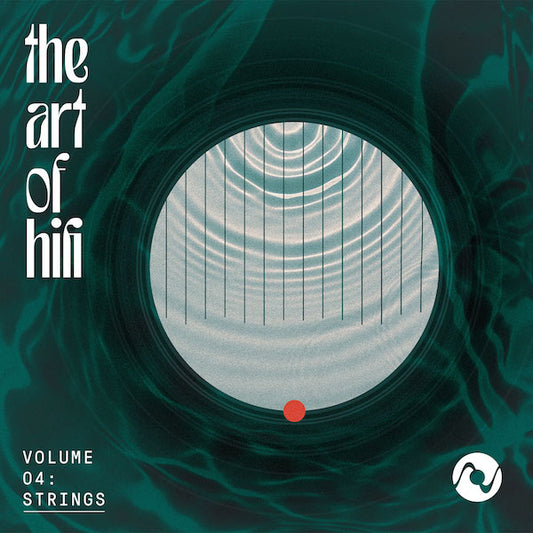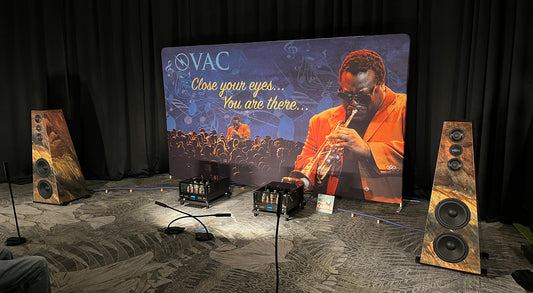Acclaimed Irish singer-songwriter Cathal Coughlan, formerly of Irish rock bands Microdisney, The Fatima Mansions, and others, is always progressing, with an eye on setting trends, not following them.
If ever-interesting, never-boring music is your thing, then look no further, as Coughlan has served up another musically diverse masterwork with his latest project, Telefís. It’s a collaboration between Coughlan and Jacknife Lee, of the band Compulsion, and producer for R.E.M., U2 and others. Telefís’s electro-pop a hAon is an amalgamation of the veteran songwriters’ influences, and is proving to be a low-key favorite album of the spring of 2022. I think many music fans will pick up on it during this – dare I say it – post-COVID summer. (One can only hope.)
I recently dug in with the Irish singer/songwriter regarding his early leanings, his many ongoing projects, his newest music, and a whole lot more.
Andrew Daly: Cathal, I appreciate you taking the time to speak with us. How have you been holding up over the last year or so? What have you been up to?
Cathal Coughlan: It’s been a difficult time for all the common reasons and more. I’ve mainly been working on my parts for Telefís, and on songs for my next solo project.
AD: What first got you hooked on music?
CC: It happened on a rolling basis over a few years, which started with hearing the Temptations’ haunting “Papa Was A Rolling Stone,” and some other great soul music of the early 1970s, on the intermittent-[reception], medium-wave (AM) signals out of the UK and Continental Europe. This was on the south coast of Ireland, where I was born and raised. Later, a family friend played me Neil Young’s After the Gold Rush on a more decent sound system, and from there I was set. I had a huge appetite for all kinds of music.
Making music came later. In Cork, where I went to school and college, there were a lot of fine musicians, but until the times after punk, the formalities and barriers to entry seemed very daunting, so it was just a dream to someone of my limited skill. But around 1979–’80, a lot of like-minded people in the locality began encountering each other, and suddenly I had role models for just getting up there and doing something.
AD: Who were some of your early influences?
CC: It’s a pretty long and some might say incoherent list. Neil Young always, the Velvet Underground and some later Lou Reed, the Beach Boys, Bowie, Roxy Music. But, also a lot of mid-’70s Joni Mitchell, Todd Rundgren, Robert Wyatt. My favorites from the post-punk area went wide – Public Image Ltd, the Buzzcocks, the Specials, the Only Ones, A Certain Ratio, Magazine, Wire, Thomas Leer and Robert Rental, the Normal. And also, the great Irish group, the Radiators, whose extraordinary album Ghostown inspired many of us.
AD: Let’s talk about current events for your Telefís project with Jacknife Lee. Tell us about your new Falun Gong Dancer EP, jointly released by Telefís and [bassist/composer] Jah Wobble, and your forthcoming a hAon debut album.
CC: Well, we released the Telefís album, a hAon on March 4, but soon after we finished recording the album, an opportunity arose to have a chat with Jah Wobble about possibly doing something, as he was high up the list of post-punk heroes, still active, who we thought about involving. The beauty of the album version of “Falun Gong Dancer” is the enormous amount of space – silence, in fact – which exists within it, so we thought, why not use some of that space to let Jah Wobble do his distinctive thing?
AD: What themes are you exploring in the music of Telefís?
CC: If I had to boil it down, I’d say the high-level theme is the unreliability of memory, and of how little credit we, as human beings, give to that unreliability. The net results of that include hankerings after golden ages which occurred before we were born, of which we basically know nothing whatever; [and] a sense of being crushed by one’s own past because one can’t recall why, for example, we occasionally failed to live up to our values. The list goes on.
Much of the framework which Telefís uses to examine this is derived from the media (especially monochrome TV, but photography also) imagery of 1960s Ireland, when Jacknife Lee and I were at various (JL is not as hideously old as I am) stages of childhood.
The country in those days was – unthinkable now – hermetically sealed off culturally. Petrified and scornful of (as well as scorned by) its neighbor and erstwhile overlord Britain, imbued with a misty-eyed longing for those representations of North America which somehow got through the sieve, or bemusedly reverent towards Continental Europe. What happened in culture was haphazard – chunks of reconstituted native (and nativist) culture, oddities from the Continent, the odd bit of Britain. And like many things which grow out of chaotic soil, the results were strange, but very popular owing to the monopoly [of the media] – [for example], one national TV channel only.
The musical and audio means of fulfilling this intention have involved taking some of the highest technology available to Jacknife Lee and distressing the hell out of it, so we’re literally as lacking in distraction when creating the music as Thomas Leer and Robert Rental were when they made The Bridge in their kitchen in 1978.
AD: How has your songwriting evolved to this point?
CC: It’s debatable whether I’ve evolved at all, to be honest. I suppose I tend to not rule out courses of action for myself as much as I did in the 2000s and 2010s – back then, I was still quite stung by what had become of “rock” music (and my previous roles in it), and was resolved that I would avoid all [the] trappings of that, which meant that I would only write songs which could be arranged in a certain way – no electric bass, no overdriven signals anywhere. I’m able to think and exercise my way out of lyrical dead ends a lot better than I used to be (or so I imagine), but a bad and non-productive day can still happen. You just have to learn where in your psyche to dig next.
AD: Are you into vinyl or other formats, or are you all digital now? Also, what are a few of your favorite albums and why?
CC: I live in a small space, so no, format fetishism is a long way beyond my means. I grew up on cassettes, didn’t start being able to play vinyl ’till I was 19 or something, so their resurgence amuses me, but other than maybe as creative tools for making music, I can’t see the point. Vinyl is great, but the bulkiness of it builds up fast.
AD: How do your other passions inform your music?
CC: I’m interested in politics, social history, and literature, but I don’t approach any of them in a manner which might be considered erudite. I suppose I tend to believe the evidence of my own lived experience more than the consensus which can grow from the more formal and even-handed approaches which are required in order to obtain and sustain academic qualifications. I do have some such qualifications, some fairly recent, but I don’t see it as my role in life to further the academy, much as I respect the need for such a thing.
My interest in social history, in particular, informs a lot of my writing. Since the mid-2010s and the rise of the current lunacies, for example, I’ve been endlessly examining perspectives on how the world seemed in 1945 and in the years which followed. Millions suffered then and beforehand, [and] one may as well make use of what was revealed.

AD: What in your opinion is the state of the music business these days?
CC: I can’t presume to provide assessments or advice here. It used to be said that Apple could have bought the remaining major [record] labels with its petty cash, and the fact that it didn’t bother doing so, frankly, speaks volumes. All that remains of the mainstream music business is an archipelago of the tech industry, with its surviving Ruritanian nobility still supping on canapes at the edge of a beach where the tide never comes in anymore. But they can bitch about numbers of Likes, and debate whether to go for a dip next April [until] the next stats come in.
There’s hope in small communities of interest, who support certain artists, within a certain genre, maybe. As a means of letting the artists know their work is appreciated, and it’s worth doing more – both extremely valuable things, for most of us –this works. But how to keep body and soul together while doing it? Merch, sync [licensing], yadda yadda – I always like to hear of people who landed on their feet in this way, but really, it tells me nothing about where I myself can go, or where I’d recommend that others go.
AD: What’s next?
CC: The second Telefís album will be out later in 2022; the tracks are finished and mixed, and we’re just mastering it at the moment. After that, there’s [my] next solo album, and interspersed with life generally will probably be the third Telefís album.
AD: What are you looking forward to most in the post-COVID world?
CC: To be honest, this is something I don’t dare think about. There are vivid signs of politics and culture warfare overtaking science, which have so far pushed the thing back. I can’t imagine where we’ll be in six months, much less in a desired hereafter.



